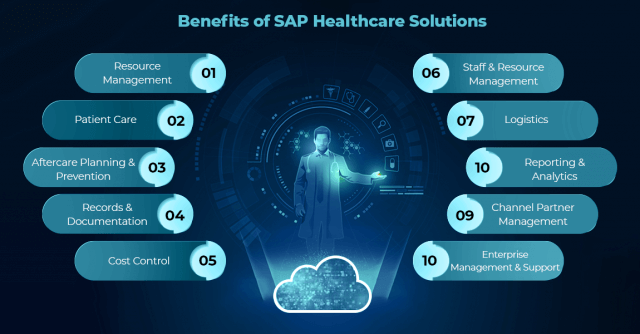There is no doubt that the life sciences and healthcare sectors are playing a pivotal role in managing the COVID-19 pandemic. There have been strategic partnerships among long-time competitors to accelerate research and develop vaccines to help cope with one of the largest ever global health crises. Governments, health systems, payers, retail pharmacies and non-profit organizations are working collaboratively with the health sector to provide widespread distribution and administration.
As the world tries to adapt to this ‘new-normal’, digitalization is opening up new possibilities in the health and life sciences sector. Redefined workplace environments, the shift in healthcare delivery, and innovative collaborations to create efficiencies are already the changes introduced by the digitization of workflows and business processes.
The disruptions and demands caused by the pandemic have already set a high bar for life sciences and healthcare businesses. They have had to re-evaluate how to keep their operations and workforce inspired while staying committed to delivering products and solutions to patients and companies the world over. Despite the instability, the past year witnessed an improvement in healthcare delivery and management due to the new digital technologies. Digitalization is fuelling a renewed sense of purpose, focus, and commitment to all healthcare stakeholders.

SAP S/4HANA
SAP S/4HANA can be used to generate predictive analysis, spatial data analysis, graph data analysis, and other advanced analytic operations that help deliver personalized care for all patients based on accumulated patient data. Informed treatment plan decisions at the patient level, behavioral patterns, and trends can be deduced at the industry level.
This can help healthcare organizations to plan facilities and arrangements to handle the expected number of patients, maintain supplies, adjust bed capacity, ensure proper stocking of critical devices, etc.
Gemini Consulting & Services can help you implement SAP S/4HANA to cater to the demands of personalized treatment and preventive care. We can be your perfect technology partner to help drive practical clinical decisions, faster diagnosis, better care, and improved cost savings in hospitals. Contact us to know more about our services for the healthcare industry.
Implementing the Ideal ERP-Based Healthcare Solution from SAP
Healthcare organizations have discovered that healthcare ERP software helps them tackle operational challenges of providing quality care without affecting cost, increased risk-factor, or inefficiencies. The right healthcare ERP software application provides a technological foundation that can easily adapt to changing workflows with the existing infrastructure without impacting cross-departmental reporting, tracking, and data analytics.
SAP ERP for the healthcare industry facilitates interaction across business services, enabling employees to work better and thereby increasing productivity without any compromise on patient care. SAP’s end-to-end solutions for healthcare organizations deliver high–value care and personalized experiences for patients while achieving operational excellence. These solutions connect processes within the business by integrating critical business functions with healthcare solutions on-premise, in the cloud, and through mobile devices.
SAP solutions provide real-time access to relevant information at the point of care, enable seamless information exchange among patients and care providers, and establish complete visibility into operational support.
SAP for Healthcare is a highly configurable set of solutions based on the SAP NetWeaver platform, with a significantly lower number of interfaces that need to be maintained. These solutions support all processes within one provider organization or among several healthcare organizations.
It offers sophisticated patient management modules that empower hospital /clinic staff and help them enhance patient care and satisfaction. It has a comprehensive back-office module that can manage critical functions such as finance, procurement, HR, and logistics.

Resource Management: Patient appointments, waiting lists, utilizing resources available at outpatient clinics, and handling bed allocations can get largely streamlined.
Patient Care: One of the most important aspects of digitizing healthcare, SAP modules help simplify every detail of patient information aiding patient identification and handling coordination. SAP modules help streamline coordination inside provider organizations as well as with other healthcare providers or with patients.
Aftercare Planning & Prevention: It is critical for all care concepts around inpatient stay including prevention and cross-functional healthcare, providers have to connect patients with care services upon discharge.
Records & Documentation: Since the accurate entry of diagnoses, activities, and services rendered is possible, the generation of health records, invoices, and related documents are more efficient.
Cost Control: Increased transparency and accountability through improved quality and accuracy of coding for basic medical service data can be assured, thereby ensuring regulatory compliance. The same can be ensured in coding for cases (case-based orders), thereby enabling comparison of planned and actual costs and providing support for preliminary costing for case-based orders.
Staff Management: Enhanced resource optimization and greater employee satisfaction through smart shift planning with extended access to employee information. This actively supports resource decisions for daily and long-term planning and budgeting in the hospital.
Logistics: Reduced process costs, increased transparency into demand and consumption, and lower warehousing and procurement costs along with support and integration of replenishment processes at the care unit and central level are possible.
Reporting & Analytics: Increased capacity to meet compliance requirements and drive service strategies through information provided by cost and revenue as well as clinical analyses.
Channel Partner Management: Optimized relationships with key partners, including patients, payers, and providers, through organized service offerings.
Enterprise Management & Support: Total control and efficiency through fully integrated analytics, financials, human capital management, corporate services, and operational support. The hospital/ clinic/healthcare center can easily function like a well-oiled machine.



